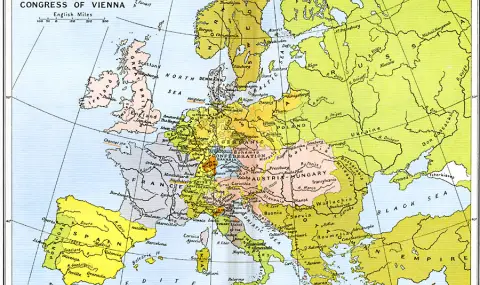On June 9, 1815, the final act of the Congress of Vienna was signed.
It was convened in September 1814 after the overthrow of Napoleon Bonaparte. All European countries except the Ottoman Empire take part in it. The decisions made became the reason for convening a meeting of the Great Powers in Berlin in 1878 to revise the preliminary San Stefano Peace Treaty and the division of the newly liberated Bulgaria into three parts.
At the Congress of Vienna, representatives from all over Europe draw the borders of the Old Continent after the fall of Napoleon. The balance of the five European powers - Great Britain, France, Prussia, Austria and Russia - has been restored again.
For their part, European monarchs use it to stifle liberal currents and bury some of the democratic conquests of the Napoleonic era.
Despite all its shortcomings, the Congress of Vienna also achieved something positive - it provided Europe with almost 40 years of peace.
The beginning was made with the Treaty of Chaumont of March 1814
He drafted the decisions that would be ratified by the more important Congress of Vienna in 1814-15. The Congress of Vienna was the first of a series of international meetings that became known as the Concert of Europe - an attempt to establish a peaceful balance of power in Europe.< /p>
It served as a model for later organizations such as the League of Nations in 1919 and the United Nations in 1945.
The decisions of the Congress of Vienna included the creation of a confederated Germany, the division of French protectorates and annexations into independent states, the restoration of the Bourbon kings in Spain, the expansion of the Netherlands to include what in 1830 became modern Belgium, and the continuation of British subsidies to the Allies.
The Treaty of Chaumont united the forces to defeat Napoleon and became the cornerstone of the Concert of Europe, which shaped the balance of power for the next two decades.
The basic principle of the European balance of power is that no single European power should be allowed to achieve hegemony over a significant part of the continent, and that this is best contained by a small number of ever-changing alliances that challenge each other the power.
The Congress of Vienna liquidated the Napoleonic world and attempted to restore the monarchies that Napoleon had overthrown, thus ushering in an age of reaction.
Under the leadership of Metternich, Prime Minister of Austria (1809-48), and Lord Castlereagh, Foreign Secretary of Great Britain (1812-22), the Congress established a system to preserve the peace.
Under the Concert of Europe, the major European powers - Great Britain, Russia, Prussia, Austria and (after 1818) France - committed themselves to meeting regularly to resolve differences. The aim is not simply to restore the old borders, but to resize the major powers so that they can balance each other and keep the peace.
The leaders were conservatives who were not interested in republicanism or the revolution that threatened to upset the status quo in Europe. This plan was the first of its kind in European history and seemed a promising way to collectively manage European affairs and promote peace.
The Congress resolves the Polish-Saxon crisis in Vienna and the question of Greek independence in Laibach. Three major European congresses are held. The Congress of Aix-la-Chapelle (1818) ended the occupation of France. The rest were meaningless as each nation realized that the congresses were not in its favor as disputes were resolved with less and less efficiency.
The Congress was the first time in history that, on a continental scale, national representatives met to formulate treaties, rather than relying primarily on communications between several capitals. The settlement of the Congress of Vienna, despite subsequent changes, formed the framework of European international politics until the outbreak of the First World War in 1914.
The Concert of Europe has no written rules or permanent institutions, but in times of crisis any of the member countries can propose the convening of a conference. Meetings of the Great Powers during this period included: Aix-la-Chapelle (1818), Carlsbad (1819), Troppau (1820), Laibach (1821), Verona (1822), London ( 1832) and Berlin (1878).
